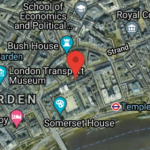International Political Economy | King’s College London
This course offers an in-depth analysis of the major scholarly debates in International Political Economy. It will give you an understanding of global issues from a variety of perspectives, including critical and heterodox.
How does the programme provide content to ensure students achieve an understanding of a reasonably diverse set of perspectives on understanding economies?
This is an MA in International Political Economy, which is at the intersection of economics and politics. Our staff has a wide variety of disciplinary background ranging from economics, political economy, sociology, politics, political science, human geography, but also anthropology and cultural studies. The degree thus offers a rich sets of perspectives on understanding economies. The main economics modules (Introduction to Economics for IPE; Macroeconomics of Distribution, Demand and Finance; Political Economy of the Financial Crisis) present mainstream theories as well as a diversity of heterodox approaches. Modules like Critical Political Economy, International Political Economy of Production and Postcolonial Political Economy analyse power relations in a global context.
How does the programme ensure students understand the interaction between economic and ecological systems?
The core IPE module covers issues surrounding resource extraction and its social as well as ecological impact and the economic impact of countries in the global south; and the debates around climate change and the anthropocene. The program offers include modules like International Political Economy of Energy Markets or Climate Change and Sustainability in Emerging Economies.
How does the programme ensure students understand how to critically explore real-world evidence, both qualitative and quantitative?
Our teaching staff represents a wide range of disciplinary backgrounds, ranging from economics, political economy, sociology, politics, political science and human geography to cultural studies and history. This is reflected in a wide range of research methodologies that include quantitative methods as well as a range of qualitative methods (discourse analysis, process tracing, archival research). Different modules will apply different research strategies. The Research Methods For Social Sciences module reflects this range.
What pedagogical approaches does the programme use to ensure that students examine the historical context, assumptions and values in all economic thinking?
The standard teaching format includes lectures and small group seminars that encourage critical discussion. Modules are based a variety of sources (rather than following a textbook), which are used to introduce students to different perspectives. As this is an International Political Economy MA heavy emphasis is based on political interests, ideational context and historical circumstances.
How does the department ensure that the teaching culture and capacity to deliver economic pluralism are continually improving?
The department is committed to pluralism in teaching economics. This is part of an IPE tradition which has strong roots in non-mainstream economics. Any teaching of economics is organised around being accessible to and useful for social scientists who engage with economic and political issues. The department cooperates with and support King’s Decolonizing Working Group. Core and optional modules are being reconsidered in the light of the comments from this student-led group.
Country:
United Kingdom
University:
King's College London
Course name:
International Political Economy
Department/school:
Dept of European and International Studies
Course level:
Taught Masters
Course language:
English

 all programmes
all programmes